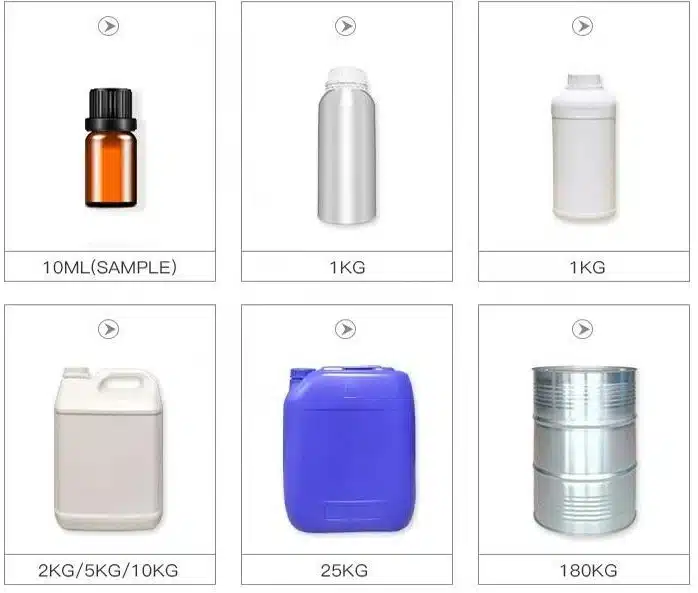
Cinnamaldehyde (Aldehyde Cinnamic)
Category:
- CAS : 57194-69-1 (cis-) / 14371-10-9 (trans-)
- Chemical formula : C6H5CH=CHCHO
- Description : Liquid, yellow to brown red color, hot and sweet spicy, characteristic odour of cinnamon bark
- Solibility : Soluble in ethanol, insoluble in water
- Reflective index : 1.570 - 1.620
- Indentification test: Aldehyde Cinnamic > 98%
WHAT IS CINNAMALDEHYDE
Cinnamaldehyde or Cinnamic Aldehyde, chemical formula: C6H5CH = CHCHO, is the main active constituent that determines the flavor and properties of cassia essential oil. In Vietnamese cassia essential oil, Cinnamaldehyde content accounts for a high proportion, from 85 to 90%. In addition, Cinnamaldehyde is also found in Camphor.
In nature, Cinnamaldehyde is an organic compound that occurs mainly in the trans (E) isomer.


CASSIA RAW MATERIAL AREA
Vietnamese cassia’s scientific name is Cinnamon Cassia. The cassia is special type in the world with high essential oil content (3-5%). This is a spice used in the food and beverage industry that many top chefs pursue.
Vietnamese cassia is a perennial woody plant with gray-brown bark and green leaves all year round. The tree is on average 18-20m tall and can be up to 40-50cm in diameter. The bark and leaves have a pleasant aroma.
Vietnam cassia is a tropical plant, suitable for moist, rainy areas, and prefers to live in sandy clay soils that are easy to drain. The more a plant grows, the more lights it requires.
Cassia is concentrated in a number of provinces in Vietnam such as Yen Bai, Quang Ninh, Thanh Hoa, Nghe An, Quang Nam, Quang Ngai… Of which Yen Bai is the main raw material area of VIPSEN.
The main raw materials for producing cassia essential oil are barks, branches and leaves. Vietnamese cassia bark has a high essential oil content, from 3-5%, leading the world.
PRODUCTION OF CINNAMALDEHYDE
At VIPSEN, cinnamaldehyde is produced by fractional distillation of cassia essential oil. This is a typical technique used to separate volatile substances from mixtures. The operating principle is based on the change in boiling temperature of the substances in the mixture because each substance will have a different boiling temperature. The volatile matter will be condensed.
After fractionally distilling cassia essential oil at VIPSEN, the cinnamaldehyde content in the finished product is up to 99%, completely natural, safe for human health.


APPLICATIONS OF CINNAMALDEHYDE
Flavoring: Cinnamaldehyde helps improve the quality of aroma and flavor in foods and beverages. Industries that produce confectionery, beverages, spices, sauces… all like to use this compound to increase appeal and stimulate consumers’ taste.
Pharmaceutical: Cinnamaldehyde kills bacteria, fungi and is an antioxidant. Therefore, the active ingredient is widely used in anti-infectious drugs, mouthwash, improving the respiratory system, digestive system…
Cosmetics: Cinnamaldehyde not only creates scent for personal care products such as soap, lotion, shampoo… but also helps rejuvenate the skin, treat acne…
Cinnamaldehyde is also used in the perfume industry, deodorants, detergents, mouthwashes, toothpastes… as a regenerator of fruit flavors and natural fragrances.
Thanks to the Cinnamaldehyde compound, it creates a pleasant and relaxing scent when used to scent rooms, workplaces, hotels, and restaurants. Besides, product is effective in repelling insects.
PACKING, STORAGE & TRANSPORTATION
Packaging: Cinnamaldehyde is packaged in liters or kilograms according to customer requirements: 1L, 5L, 10L, 30L, 180L/ 1Kg, 5Kg, 10Kg, 30Kg, 180Kg…
Storage: The product is packed in standard HDPE packaging. Store in a dry, cool place, away from direct sunlight. Avoid contact with eyes, open wounds, sensitive skin areas.
Transportation: Domestic: Flexible nationwide transportation by ship, truck, airplane…
Export: Ship/Airplane, Export conditions: FOB/CIF/Door to door…














